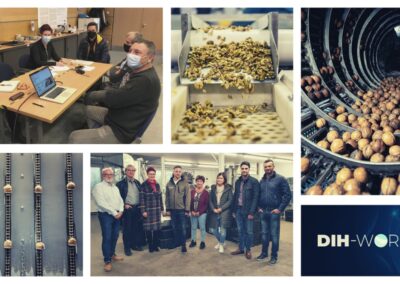Pilot Experiments
DigiNuss Info: Experiment to monitor the quality of food processes and inform consumers at a high level
Hungary
![]() INNOSKART-DIH
INNOSKART-DIH
Experiment objective
Innoskart connected Bionuss to Seacon Ltd. as tech provider SME member of INNOSKART-DIH that has experience in digitalization of Quality Management Systems. The aim of this innovative experiment is to improve traceability in the value chain and give digital tools to Bionuss to follow the quality of the walnut through the whole process.
This experiment aims to bring the company a significant improvement in the actual product information available in the value chain: in addition to their wholesale partners, they also get closer to consumers they cannot reach directly. The experiment will result in real-time information to support consumers’ perception of the quality of their products.
Challenges
Bionuss is facing a big challenge in the future in the market of organic walnut products. The quality and the quantity of the corps fluctuates year by year and the Hungarian market is not stable. There are too many hazards. In recent years the Rhagoletis Completa insect appears on the farms which can destroy all the harvest and in the case of organic products any pesticide is not allowed to be used. In parallel, very cheap and low-quality walnut-in shell products appeared on the Hungarian market. The only possibility for Bionuss to keep the customers is by providing high quality, safe and traceable products by increasing the digitalization level from paper-based documentation to digitalised information system, using the digital Quality Management System tool
Implementation Solution
The quality information from the different process steps are:
- Walnut suppliers besides their own walnut breeding. Several large and several small producers’ batches are supplied. It is essential to use clear labelling to identify them.
- Receipt of goods: for traceability reasons, the delivered nuts are given a supplier batch number and the most important data are recorded.
- Qualification of incoming goods each incoming item is graded according to specific characteristics (size distribution, appearance, contamination, moisture content). In the case of a homogeneous item 1 sample is sufficient, but if the sample is not homogeneous to the eye several individual samples are necessary.
- Washing and cleaning of the walnut to remove the physical contamination
- Drying the accurately identified drying batches (it is the most important element for traceability).
- Sorting of nuts: Size distribution in % by weight
- Identification of butches, delivery lots.
- Breaking and separation of kernel and walnut-shell,
The digital innovation for Bionuss means the quality management system will be digitalized and get real time information about the quality of each batch through all process steps. The very important aspect is the software has to be easily used by the management and employees.
The solution to be built in the experiment must be able to track composition, sensory characteristics, and physical and chemical properties. It must be possible to trace the entire production chain: 1) where, 2) when, 3) from what and how the raw material was produced, how the finished product was obtained, and how the raw material was used to produce the finished product. The digitalised Quality Management System will contain all the parameters through the process.
Results Obtained
With the coordination and support of Innoskart DIH a very good relationship and cooperation was established between BioNuss and Seacon Europe – as a digital service provider. As a result, the QST model loaded with 2 additional warehousing management modules was successfully adapted to support the BioNuss quality control process. The business model at Bionuss is to buy raw materials even from old, existing partners on the basis of annually renewable contracts. The system can be used to pre-qualify batches at the walnut producer’s premises at the time of purchase, ensuring that BioNuss receives raw nuts of the right quality.
Impact of the experiment
The innovation name is Monitoring the Quality of food processes and inform consumers at high level adaptation of QST system and it is based on the implementation of a software system supporting quality management in a very small food processing SME. The impact is significant and economic as producing better and certified quality products clearly improves the company’s market stability. This is absolutely necessary, for the planned capacity expansion. Quality can be tracked throughout the production process and the quality certificate can be delivered with the product.
Dissemination
Innoskart DIH prepared a leaflet and a promotional video. The final event of the project was organised in conjunction with the DIH-World Community Days event on 8 April 2022. The face-to-face event took place at the University of Óbuda in Székesfehérvár. At the event, we presented the results of several successful digitisation projects. We invited 3 Hungarian DIH organisations to present their DIH services and to share their experience. The event was also communicated on the Innoskart Digital website and in social media.


